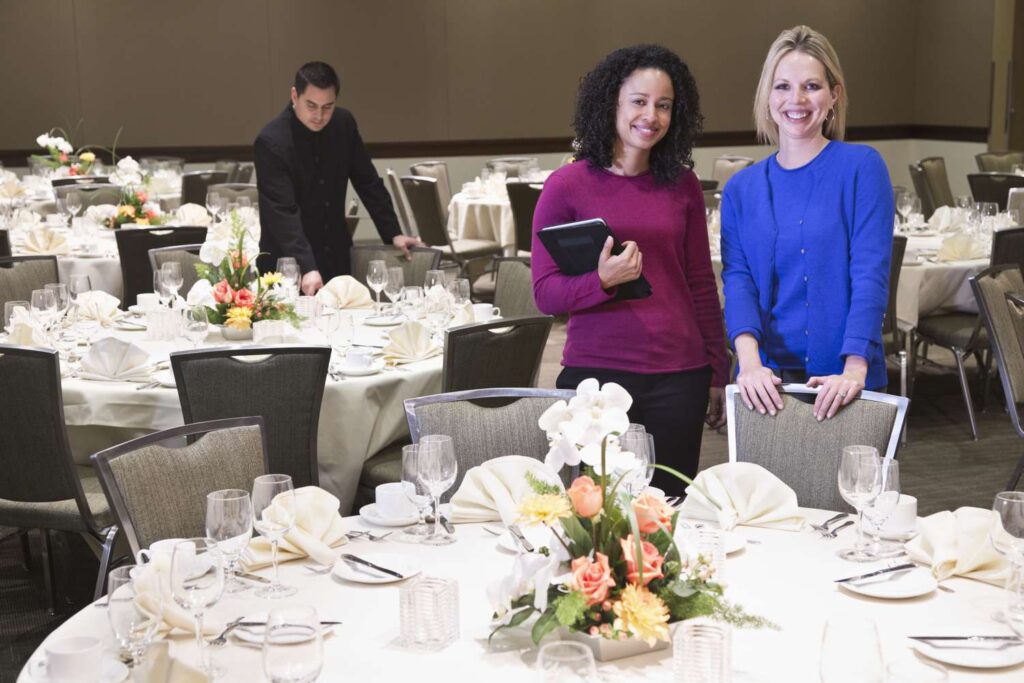Introduction
The event planning industry is thriving, with a growing demand for professionals who can organize, execute, and manage events that are both impactful and memorable. Whether it’s a corporate conference, a wedding, a large-scale trade show, or a private social gathering, event planners play a crucial role in making sure that everything runs smoothly.
As the global event planning market continues to expand, professionals are increasingly in demand across various sectors. From small parties to large corporate galas, the world of event planning offers diverse and rewarding career opportunities.
In this article, we will explore the different types of event planner jobs, the necessary skills and qualifications, salary expectations, job outlook, and trends in the industry as we approach 2025. This guide is designed to give you an overview of what you can expect if you are considering a career in event planning and how to succeed in this fast-paced and exciting field.
Types of Event Planner Jobs
Event planning is a broad field that encompasses a wide range of specialized areas. Depending on your interests and expertise, you can focus on organizing corporate events, weddings, social gatherings, conferences, or even large public festivals. Here are some of the most common types of event planner jobs:
1. Corporate Event Planner
Corporate event planners focus on organizing business-related events such as conferences, seminars, team-building activities, product launches, and annual meetings. These events typically require meticulous planning, precise budgeting, and attention to detail, as they represent the business to employees, clients, and stakeholders.
Key Responsibilities:
- Organizing company retreats, conferences, and seminars
- Coordinating logistics, such as venue selection, catering, and audio-visual needs
- Managing budgets and ensuring cost-effective event execution
- Ensuring all company brand guidelines and objectives are met
Salary Range: $50,000 – $100,000 annually.

2. Wedding Planner
Wedding planning is one of the most popular niches in the event planning industry. Wedding planners are responsible for organizing and executing every aspect of a couple’s big day, from venue selection to vendor management and timeline coordination. Wedding planners must also work with various vendors such as caterers, florists, photographers, and entertainers.
Key Responsibilities:
- Organizing the wedding ceremony and reception
- Managing vendors, including florists, caterers, and photographers
- Coordinating schedules, timelines, and guest lists
- Assisting with wedding budgets and contract negotiations
Salary Range: $40,000 – $80,000 annually.
3. Party Planner
Party planners specialize in organizing social events such as birthdays, anniversaries, or holiday parties. These events are typically smaller and more informal than weddings or corporate events, but still require thorough planning to ensure a fun and memorable experience.
Key Responsibilities:
- Organizing themed parties, birthdays, and other private events
- Coordinating with vendors for food, entertainment, and decorations
- Managing invitations and RSVP lists
- Ensuring guests have a fun and seamless experience
Salary Range: $35,000 – $60,000 annually.
4. Conference and Trade Show Planner
This type of event planner is responsible for organizing large-scale events, such as conferences, trade shows, and exhibitions. These events require more complex logistics, as planners must coordinate with multiple vendors, large attendee groups, and various sponsors.
Key Responsibilities:
- Planning and managing large-scale conferences and exhibitions
- Securing sponsors and exhibitors for trade shows
- Managing registration, attendee engagement, and venue logistics
- Organizing sessions, keynote speakers, and panel discussions
Salary Range: $60,000 – $120,000 annually.
5. Non-profit and Charity Event Planner
Non-profit organizations and charities frequently organize fundraising events, galas, and charity auctions to raise money for their causes. Non-profit event planners focus on organizing these events, which often involve coordinating volunteers, securing donations, and ensuring the events meet their fundraising goals.
Key Responsibilities:
- Organizing fundraising events and charity auctions
- Managing volunteer teams and event logistics
- Coordinating with donors and sponsors to secure contributions
- Promoting the event to ensure maximum attendance and donations
Salary Range: $40,000 – $70,000 annually.
6. Virtual and Hybrid Event Planner
With the rise of technology, virtual and hybrid event planning has gained tremendous popularity. Virtual event planners specialize in organizing online events such as webinars, virtual conferences, and live-streamed performances. Hybrid event planners manage both in-person and virtual components of an event simultaneously.
Key Responsibilities:
- Organizing virtual and hybrid events using platforms like Zoom or Microsoft Teams
- Managing technical aspects, such as live streaming, attendee registration, and platform troubleshooting
- Coordinating both physical and virtual event logistics
- Ensuring a seamless experience for both in-person and online attendees
Salary Range: $50,000 – $90,000 annually.
Skills and Qualifications for Event Planning Jobs
To succeed in the competitive world of event planning, a combination of technical and interpersonal skills is crucial. Here are the key skills and qualifications needed to become a successful event planner:
1. Organizational Skills
Event planning is all about managing multiple tasks and ensuring that everything falls into place. Strong organizational skills are essential to handle event timelines, budgets, vendor coordination, and attendee management.

2. Communication and Interpersonal Skills
As an event planner, you will constantly interact with clients, vendors, and team members. Strong communication skills are necessary for negotiating with vendors, coordinating with staff, and ensuring clients are satisfied with the event.
3. Creativity
Creativity is at the core of event planning. Whether you’re designing a unique wedding theme, crafting an engaging conference agenda, or coming up with innovative ways to keep guests entertained, creativity allows you to stand out in the industry.
4. Problem-Solving Abilities
Event planning often involves overcoming unexpected challenges, such as last-minute venue changes or technical issues. Being able to think quickly and find solutions is a valuable skill in this profession.
5. Attention to Detail
Every aspect of an event must be carefully planned and executed. A successful event planner pays close attention to the smallest details, from the color scheme to the timing of each segment, ensuring that nothing is overlooked.
6. Financial Management
Event planners are responsible for managing event budgets, ensuring that costs stay within limits while still delivering a high-quality experience. Understanding how to allocate funds effectively and make cost-effective decisions is essential.
How to Start a Career as an Event Planner
1. Education and Training
While some event planners start their careers through hands-on experience, many pursue formal education in event planning, hospitality management, or a related field. Many universities and colleges offer specialized degrees or certifications in event management.
2. Certifications
Certifications can help boost your credibility and skills in the field of event planning. Some well-known certifications include:
- Certified Meeting Professional (CMP)
- Certified Special Events Professional (CSEP)
- Event Planning Certification from The Meeting Professionals International (MPI)
3. Building a Portfolio
A strong portfolio showcasing your previous event planning experiences is crucial to attracting clients. Include photos, testimonials, and case studies of successful events you’ve organized to demonstrate your skills.
4. Networking
Networking is key to gaining clients and finding job opportunities. Attend industry events, engage with event planning professionals on LinkedIn, and join relevant groups to stay connected with potential clients and colleagues.
5. Gaining Experience
Consider starting with internships or volunteer work to gain experience in the field. Working for an established event planning company can provide valuable hands-on experience that will make you more competitive in the job market.
Salary Expectations for Event Planners
Salaries for event planners vary depending on the type of events you plan, your experience, and your location. The average salary for an event planner in the United States is between $45,000 and $75,000 annually. Below is a breakdown based on different types of event planners:
- Corporate Event Planner: $50,000 – $100,000 annually
- Wedding Planner: $40,000 – $80,000 annually
- Party Planner: $35,000 – $60,000 annually
- Conference and Trade Show Planner: $60,000 – $120,000 annually
- Non-profit Event Planner: $40,000 – $70,000 annually
- Virtual Event Planner: $50,000 – $90,000 annually

Job Outlook and Industry Trends in 2025
The event planning industry is growing rapidly, with increasing opportunities as businesses and individuals continue to host events worldwide. Here are some of the key trends shaping the industry in 2025:
- Virtual and Hybrid Events: As remote work becomes more prevalent, virtual and hybrid events are gaining popularity. The demand for virtual event planners is expected to continue growing, with an emphasis on seamless online and offline experiences.
- Sustainability: There is a growing trend toward eco-friendly and sustainable events. Event planners are increasingly focused on reducing waste, using sustainable materials, and ensuring that events have minimal environmental impact.
- Technology: The integration of technology into events is evolving. From augmented reality to live streaming, technology plays a major role in enhancing the event experience for attendees.
Conclusion
Event planning is a dynamic and rewarding career that offers a wide range of job opportunities. Whether you’re passionate about organizing weddings, corporate conferences, or social gatherings, event planning can provide both professional growth and personal satisfaction. As the industry continues to evolve, it offers exciting prospects for aspiring planners in 2025 and beyond.
If you’re considering a career in event planning, focus on building the right skills, gaining relevant experience, and networking to establish yourself in the field. With the right preparation and dedication, you can build a successful career in event planning and make a lasting impact on the world of events.
